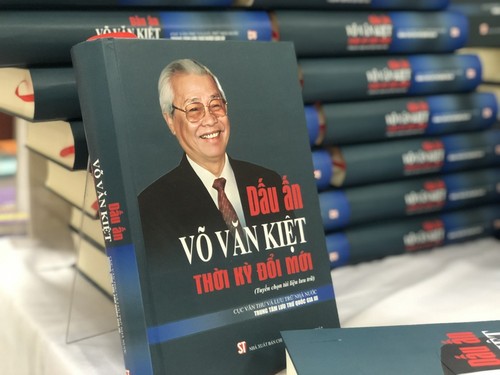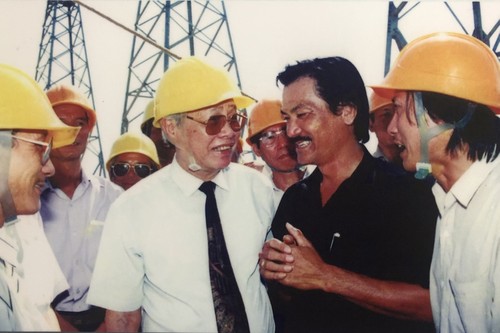 A book portraying Prime Minister Vo Van Kiet published by the National Political Publishing House. (Photo: Le Lam/ zingnews.vn) A book portraying Prime Minister Vo Van Kiet published by the National Political Publishing House. (Photo: Le Lam/ zingnews.vn) |
After national reunification in 1975, Ho Chi Minh City faced a stagnant socio-economy. As the city’s leader at that time, Mr. Kiet took drastic steps. He conducted fact-finding tours to factories and production sites to understand the aspirations of business owners and workers and set up an economic research office to devise policies to guide Vietnam’s economic reforms.
“Mr. Vo Van Kiet is a decisive person. As Secretary of the Party Committee in Ho Chi Minh City, and then Deputy Prime Minister and Prime Minister of Vietnam, he launched plans and initiatives to improve people’s lives. He conducted lots of fact-finding tours and made decisions based on people’s aspirations, the advice of experts, and his own knowledge and experience,” said Associate Professor. Dr. Phan Xuan Bien, Vice Chairman of the Vietnam Association of Historical Sciences.
With his spirit of innovation daring to think, daring to do, and taking responsibility, Mr. Kiet inspired the political system of Ho Chi Minh city to stimulate production and recover the economy. Associate Professor Dr. Ha Minh Hong, head of the Faculty of History of the Ho Chi Minh City University of Social Sciences and Humanities, said reforms faced many difficulties and challenges, but Mr. Vo Van Kiet managed to overcome them all, putting the nation and the people’s benefit and interests first.
“Mr. Kiet was the one who initiated renovation plans and got the whole political system and the public to join his renovation effort. He was a decisive and prestigious leader”, said Hong.
 Prime Minister Vo Van Kiet inspects the construction of the transnational 500kv transmission line in 1993. (Photo: Ngo Minh Dao/National Archives Centre III) Prime Minister Vo Van Kiet inspects the construction of the transnational 500kv transmission line in 1993. (Photo: Ngo Minh Dao/National Archives Centre III) |
In the early 1990s, the southern region faced a serious power shortage. Prime Minister Vo Van Kiet requested the construction of a 1,500 kilometer 500kv transmission line, connecting 14 cities and provinces. Construction began in April, 1992, and was completed 2 years later.
Engineer Ho Anh To, who was in charge of building the southern section of the transmission line, says Prime Minister Kiet also directed the construction of the Tri An Hydropower Plant in 1987 and a number of other power projects.
“Prime Minister Vo Van Kiet’s decision to construct the 500kv transnational power line helped to ensure energy security and economic growth, and created jobs for thousands of workers. His decision greatly contributed to national development,” said To.
Engineer Nguyen Ba Man, former Director of the Management Board of Hydropower Projects on the Dong Nai river, who worked for 30 years on hydropower projects in the south, said he was impressed by Prime Minister Kiet’s flexible but strong leadership style.
“The Ham Thuan-Da Mi Hydropower project produced an electricity output of about 1.7 billion kWh per year and also irrigated about 40,000 hectares of rice in Binh Thuan province and other provinces,” said Ma.
”At that time, Vietnam started receiving Official Development Assistance (ODA) from Japan, 650 million USD from which was spent on this hydropower project under the direction of Prime Minister Vo Van Kiet,” he added.
With his determination and strong spirit of renovation, Prime Minister Vo Van Kiet had left great imprint on Vietnam’s socio-economic development.